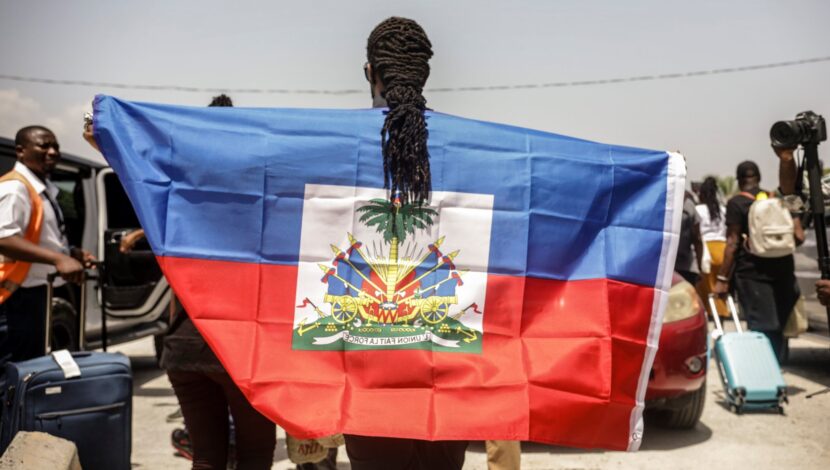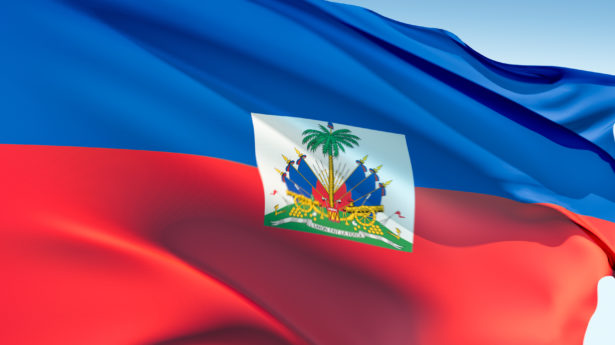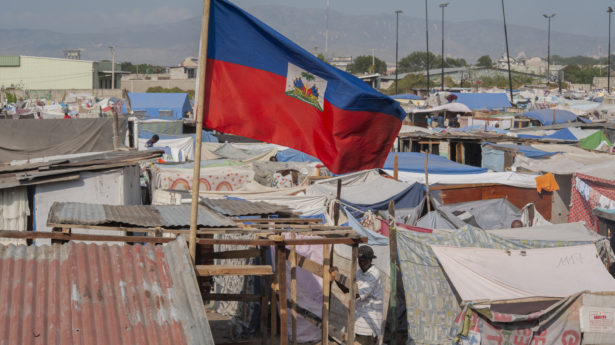The Unitarian Universalist Service Committee advances human rights through grassroots collaborations.
Let Democracy Triumph in Haiti

By UUSC Staff on September 15, 2022
The United Nations recognizes September 15 as the International Day of Democracy—a time to acknowledge, celebrate, and advance the cause of inclusive, participatory governance around the world. This day has special significance for UUSC, because many of our partners around the world are actively struggling to restore inclusive democracy in their home countries. These include places like Burma—where a military dictatorship is trampling on the rights of Burmese citizens, and a fierce resistance movement is seeking to restore democracy—as well as the Caribbean nation of Haiti.
For more than two centuries—following the successful revolt of the country’s formerly-enslaved inhabitants—Haiti has served as a beacon of freedom around the world. While the country has faced many obstacles—including interference and exploitation from European and North American colonial powers—it has remained a place of refuge for formerly enslaved people, and a living example of free, republican governance by people who had thrown off the unjust yoke of their former captors.
Even as Haiti symbolizes the ideals of democracy, however—such as freedom, equality, and the right of every person to a voice in how they are governed—actual participatory governance on the island today is in short supply. As has been the case throughout Haiti’s history, this democracy-deficit is once again largely the fault of interference in Haiti’s internal affairs by powerful foreign actors.
Haiti’s former president, Jovenel Moïse, was a U.S.-backed autocrat who spent the final two years of his reign governing by personal decree before being killed by an assassin’s bullet in the summer of 2021. Moïse’s successor, the current Prime Minister Ariel Henry, was never elected to office. Instead, he was hand-picked by Moïse before the latter’s death, and his claim to power was cemented through the unilateral acknowledgment of the United States and other external powers, acting without the consent of the Haitian people or members of the country’s civil society.
Since taking power, concerning facts have come to light indicating Henry may have known about, or even had a hand in, the former president’s assassination. And while he has repeatedly promised to hold free elections to choose a new leader of the country, he has now spent more than a year in office, and there is still no realistic prospect of a vote in sight. Worse, Henry has refused to accept any limits on his personal authority as part of negotiations with a coalition of Haitian civil society (including UUSC partners), who are working to create a path to the rule of law, democratic elections, and constitutional order in Haiti. In short, Henry has shown all the signs of falling into the same autocratic mold as his predecessor.
Moreover, while Henry imposes new obstacles to a democratic transition, the conditions of life for ordinary Haitians are only getting worse. Due in part to the rampant corruption of Moïse and the successor government, organized gangs now control large parts of Haiti and are inflicting a reign of violence and terror. Costs of living are also racing upward in Haiti, putting a decent and dignified life out of reach for the country’s impoverished inhabitants.
This combination of autocratic rule, soaring costs, and plunging living standards prompted Haitians to take to the streets last month, in nationwide protests against Henry’s government. Their legitimate demands for democracy, decent living standards, and physical safety were met with violence. Associated Press journalists witnessed at least one shooting of a protester by an unidentified individual during these protests, and police were reportedly responsible for killing 12 people who were participating in the demonstrations. With these conditions deteriorating by the day, why is the U.S. still supporting Henry?
The United States often expresses support in the abstract for democracy around the world—but its actions in Haiti have clearly not been consistent with this posture. The Haitian people have already laid out a path to restore democracy and stable governance in the form of the Montana Accord: a platform developed by a broad coalition of Haitian civil society, including UUSC partners. Yet the United States government has been far more of an obstacle to this effort than a friend.
Although the U.S. State Department expresses support for the Montana Accord, they simultaneously back Henry’s specious claim to power. And—as mentioned above—Henry in turn has torpedoed negotiations intended to implement the Montana principles by refusing to accept limits on his personal authority.
The United States could easily choose a different path. Jacques Ted St Dic, an economist and leader in the Montana Accord effort, lays out three steps the Biden administration could take to support, instead of hindering, the cause of Haitian democracy. These include deploying U.S. influence in the negotiations with Henry to: 1) restore a separation of powers between the three branches of government, in accordance with Haiti’s constitutional order; 2) ensure that Henry engages productively with the Montana framework, under which provisional legislators have already been elected and just need to take office; and 3) help restore the rule of law and end political corruption in Haiti by disrupting organized crime.
UUSC members can help call on the Biden administration to pursue these goals by using our partners’ coalition action. Follow the link to help us send the message that U.S. leadership must get out of the way of the Haitian people. What better way to mark the International Day for Democracy than to help achieve participatory governance in a country where it has been for so long withheld?
Photo Credit: AyiboPost

